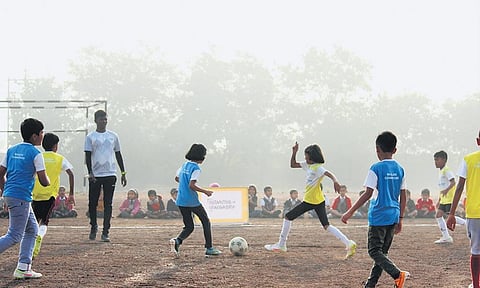

CHENNAI: Amid sharp whistles and the harsh sun, 11-year-old Swetha sprints across a brown pitch, passing a football, and guiding her team to score goals. For 90 minutes, this team of three boys and three girls attempt to dribble their way to victory. Yet, over two years ago, Swetha could not imagine learning to play football.
While it took her a few tries to learn, the now-defender and striker says, “I thought we girls couldn’t play football, but watching the boys practise, we thought we can also play like the boys. The coach told me, enna panra nee, olunga vilayadu, unnala mudiyum (what are you doing? Play well, you can do this), he showed me again and again. And I got it.”
Swetha is among the 500-plus government students in the city taking part in the mixed-gender football competition conducted by NGO Enabling Leadership (EL). On November 28, along with her team, she attended the first preliminary and district matches of the 2023-24 Mixed-Gender Football League. Here, government school students between nine and 13 years old are trained in mixed-gender play.
“Using the medium of team sports and art, our curriculum focuses on building belief in self and others. It is about whether can you express yourself, or are you free to communicate what you think. Within that, the idea is about empowering girls, which is a big deal everywhere and much more so in India,” explains Ravi Sonnad, CEO and founder of EL. Their gender mainstreaming techniques play themselves out on the field, tackling discrimination one match at a time.
Breaking barriers, learning leadership
In the ‘Battle of The Sexes’ match in 1973, athlete Billie Jean King bested Bobby Riggs during a tennis match in Houston, proving sports was based on skill and not gender. As Billie says, “Everyone thinks women should be thrilled when we get crumbs, and I want women to have the cake, the icing, and the cherry on top too.” Five decades later, women continue to struggle to be taken seriously in the world of sports.
“Parents think that girls should do housework and not play. They think if girls play football, they might get hurt but here, boys and girls play like siblings, and they make sure the girls don’t get hurt,” says Swetha. After starting her football classes, Swetha says she learned confidence, the art of trust, and leadership on and off the pitch. “If you are team captain, you need to trust and guide teammates. Suppose the ball comes to me, I should pass it to them and help them score a goal. Earlier, if I was leader, nobody listened to me, but when I started to play football, they hear my words,” the athlete says.
Now, twice a week, the student joins her teammates and coach on the ground, lacing up her shoes, brushing up on her drills, and learning new movements. As for 12-year-old Ansh, he admits he initially felt disheartened that girls were put on their team. “But we learned from the girls and they learned from us, I have seen both put in efforts, dribbling and defending, girls tried to shoot after seeing us and we also learn from them.” For this 7th grader, practise takes precedence.
Initially, Jude Anthony Atkinson, program associate, began coaching students in five schools, he noticed ego, jealousy, and lack of communication. “In the syllabus, we should show the equality. Earlier, the teachers used to separate them but now, they talk about (improvements) and how they are studying so well,” he says. He cites the example of a student helping her male classmate during exams, and how his test paper drastically improved.
On the court, he watched as girls would hang back as defenders and goalkeepers. “The girls would also struggle with accuracy and kicks. But now, girls also playing forward, striker, and midfielder. I feel the confidence has improved…there’s no difference between a boy and a girl taking a shot, it is about how you take it in your mind,” Jude adds.
Curriculum in the centrefield
An ardent fan of Cristiano Ronaldo, Jude swears by the 2016 Portugal vs France Euro finals as a lesson in leadership. “Ronaldo, Portugal’s captain, was injured, and they put in another player. Despite his injury, he guided them and Portugal won,” he says.
Transforming schools, EL’s framework is framed to teach life skills, problem-solving, and collaboration, says Ravi. “Every one of the sessions has a particular objective with workshops and sessions; it teaches you how to pass the ball, talk about how communication and collaboration work, and teach you a difficult kick. There’s a debrief at the end, we get them to write what they have learned and what they felt went well.”
Within the curriculum, it is crucial to “use gender-neutral language while addressing the children and coaches have been oriented to look out for kids, and carry first aid kits. Parents come to see sessions and we ensure they are safe,” explains Ephrahim Olive Raj Christian, program manager. Armed with these techniques and their experiences on the ground, he adds, the children will try to pick these qualities and relate them to their lives.
With the main league nearing in the next few months, the students are back on the fields. According to Ravi, EL hopes to extend its outreach to rural areas. He adds the intervention aims to alter the ruling view of girl children and change mindsets in the future. As for Swetha, zig-zagging across the fields, she has her plan for the future. “I want to become a doctor and a footballer and be able to treat injuries on the field while we play our game,” she says.